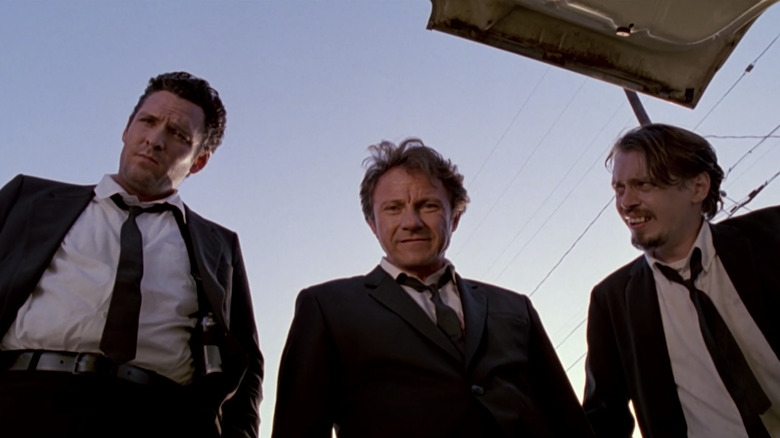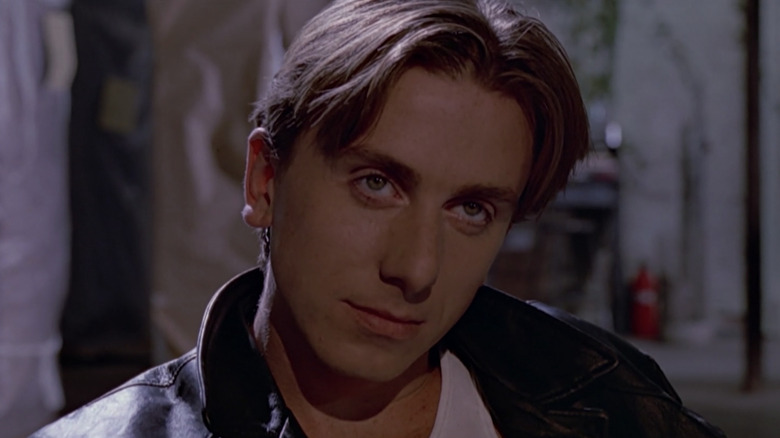Quentin Tarantino Took A Novel Approach To The Structure Of Reservoir Dogs' Script
In his 1992 directorial debut, "Reservoir Dogs," Quentin Tarantino took a storytelling approach that was both novel — in the sense of being fresh and atypical — and novelistic. Tarantino has since gone on to novelize his own movie, "Once Upon a Time in Hollywood," and he has also talked up the possibility of doing that with "Reservoir Dogs," saying that he already wrote two chapters. However, long before he went into this new literary phase of his career, he was just an up-and-coming filmmaker, applying novelistic techniques to a heist movie where the viewer never sees the actual heist.
Tim Roth, who committed to his role in "Reservoir Dogs" after a night of drinking with Tarantino, was particularly impressed with the structure of the young auteur's script. The film's main setting is a warehouse where Roth's character, Mr. Orange, and other members of the criminal gang gather in the aftermath of a jewelry store robbery gone wrong. Orange has been shot in the gut during a getaway car-jacking, so Roth spends his warehouse scenes on the floor in a pool of blood. However, the film flashes back to before the robbery and shows us how he and the other characters, including Mr. White (Harvey Keitel) and Mr. Blonde (Michael Madsen), got there. In this way, some characters who died during the post-robbery shootout are able to come back to life onscreen.
Tarantino would again use this nonlinear structure in his follow-up feature, "Pulp Fiction," which was partially inspired by "Black Sabbath," Mario Bava's 1963 horror anthology film. It's something he was "obsessed with" at the time, according to a 1993 article on "Reservoir Dogs," reposted by Empire for the film's 25th anniversary in 2017. Tarantino said:
"I actually think that if movies were to follow closer the rules for novels, they would benefit. In the transition from novels to movies, one of the first things that goes is the structure. Chronological order isn't the only way you can tell a story. Novels go back and forth all the time. A novel thinks nothing of starting in the middle of the story."
Tarantino was ahead of the antihero curve
In the 21st century, filmmakers like Christopher Nolan, whose breakthrough feature, "Memento" was influenced by "Pulp Fiction," have taken the ball from Tarantino and continued to play with nonlinear narratives in their movies. At the same time, antihero leads have become increasingly common on television, ever since HBO's "The Sopranos" made a protagonist out of its mob boss and therapy patient, Tony Soprano. Shows like that one and FX's "Justified," which Tarantino is set to help revive, may owe a debt to "Reservoir Dogs" and Tarantino's other crime films, though, since his predilection for rough-edged characters helped popularize them more as he came up through the independent film scene in the 1990s. Back in '93, Tarantino said:
"In movies, everybody has to be so f***ing likeable. You can write a novel about a perfect bastard, it doesn't mean you don't want to turn the page. I like deciding what I'm gonna reveal and when I'm gonna reveal it, I think a certain suspense comes from that. I don't know if you're confused in Reservoir Dogs, but you're curious about what the f***'s going on."
Sentiments like these might seem fairly quaint now, given the sheer deluge of dark dramas we have seen on television and in movies in the intervening years since "Reservoir Dogs." Tarantino did not singlehandedly reinvent the wheel, either, when it comes to telling stories out of chronological order or building them around bad guys. However, "Reservoir Dogs" was instrumental in helping that kind of storytelling cross over into the mainstream so that it is now something viewers might take for granted in the 2020s.

